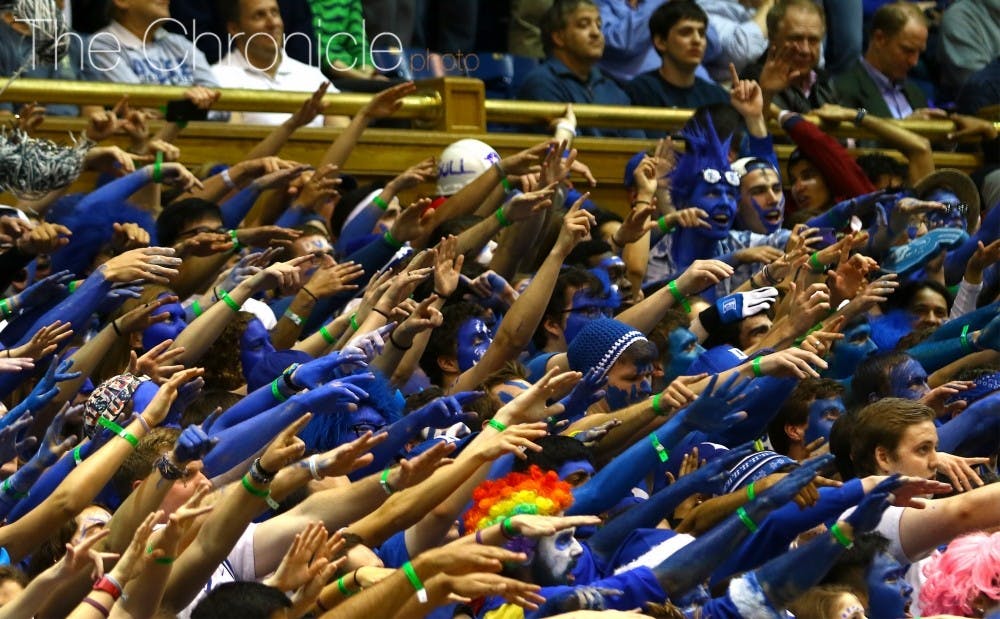On Saturday, I was one of the many people who crowded into Cameron Indoor for a Duke vs. Virginia matchup that did not disappoint. I jumped, I screamed, and I sweated profusely. It felt, as it often does in Cameron, that everyone was united as a Duke community.
Except for one guy who was a few feet away from me and at least a few beers deep. Multiple times, he screamed the name of a UVA player as loud as he could, and then yelled, “you suck d*ck!”
I love the overall energy of the student section. I love the dirt sheets. I have no problem screaming at the refs when they make bad calls. And chanting “UMBC” when Virginia was shooting free throws was maybe the best thing ever. Being ruthless to our opponents is part of what makes games fun, and what makes Cameron one of the most notorious arenas in college basketball.
But his comment made me uncomfortable, and looking around, I could tell that others felt the same. What makes “you suck d*ck” different from anything else we yell at our opponents?
It’s different because it’s not about a player, his mistakes in the game, or even his personal life. By using that phrase, the insinuation is that the player is gay, or at least engages in homosexual acts. And when it’s used as an insult, the implication is that gay equals bad. If you don’t think it’s about that, ask yourself why no one insults men by suggesting that they engage in sexual acts with women. That wouldn’t be considered as mean—if anything, it could be taken as a compliment.
It might seem like a harmless comment, and one could argue that the guy didn’t mean anything by it. But the effects of words that target an identity can be hard to understand when that identity is not yours. When I played Little League baseball, I didn’t fully understand why my mom was so upset that our assistant coach referred to us as “ladies” when we played poorly. He was, of course, equating our bad fielding to being female. He was equating femininity with weakness. Since it wasn’t my gender being used to chastise, I didn’t think much of it. But I have since realized how much comments like “grow a pair” and “don’t be a p**sy” can upset the female-identifying people around me. “You suck d*ck” works in a similar way—if your sexuality isn’t the butt of the joke, it’s hard to understand how degrading and isolating it can make someone feel.
This kind of language is a symptom of a larger problem. Many columnists have discussed the difficulty of finding a community at Duke. Comments that turn an aspect of one’s identity into an insult are an easy way to make someone doubt whether Duke is their place. A death threat written on the wall of a first-year dorm three years ago made it clear that not everyone in our campus community was willing to accept LGBTQ-identifying individuals. And even when this group is not explicitly excluded, it is not particularly included in society at large. Movies, lyrics in popular music, Greek mixers between all-male fraternities and all-female sororities—in all of these, representations of anything other than heterosexuality are an exception to the norm.
And beyond this one incident, there is the general fact that we are often unaware of the degree to which intolerance can be built into our vernacular. A fellow columnist wrote about the importance of political correctness in terms of respect for historically marginalized groups. What makes this a hard but important ask is that it takes effort and intentionality to make changes to your daily language. Coming into college, I didn’t understand how casually throwing around phrases like “I’m so OCD” or “I basically have PTSD” can contribute to the stigma around mental health. I’m still struggling to adopt gender neutral pronouns into my vocabulary. But I think the most important first step is to recognize the implications of our words, regardless of our intent.
When our opponents walk into Cameron, and when our players walk onto the court at other schools, they’re prepared to be subjected to insults and mocking—like it or not, it’s part of the game. But Duke students who flood into the student section are there to come together and cheer for Duke, against a common enemy, as members of this community. Duke students should not have to worry about peers attacking their own identity to distract an opposing player.
Duke students are good at thinking of creative ways to torment opponents during basketball games. I am confident that we can find clever and merciless ways to make Cameron even Crazier without insulting the identities of our peers.
Ethan Ahuna is a Trinity senior. His column runs on alternate Tuesdays.
Get The Chronicle straight to your inbox
Signup for our weekly newsletter. Cancel at any time.

